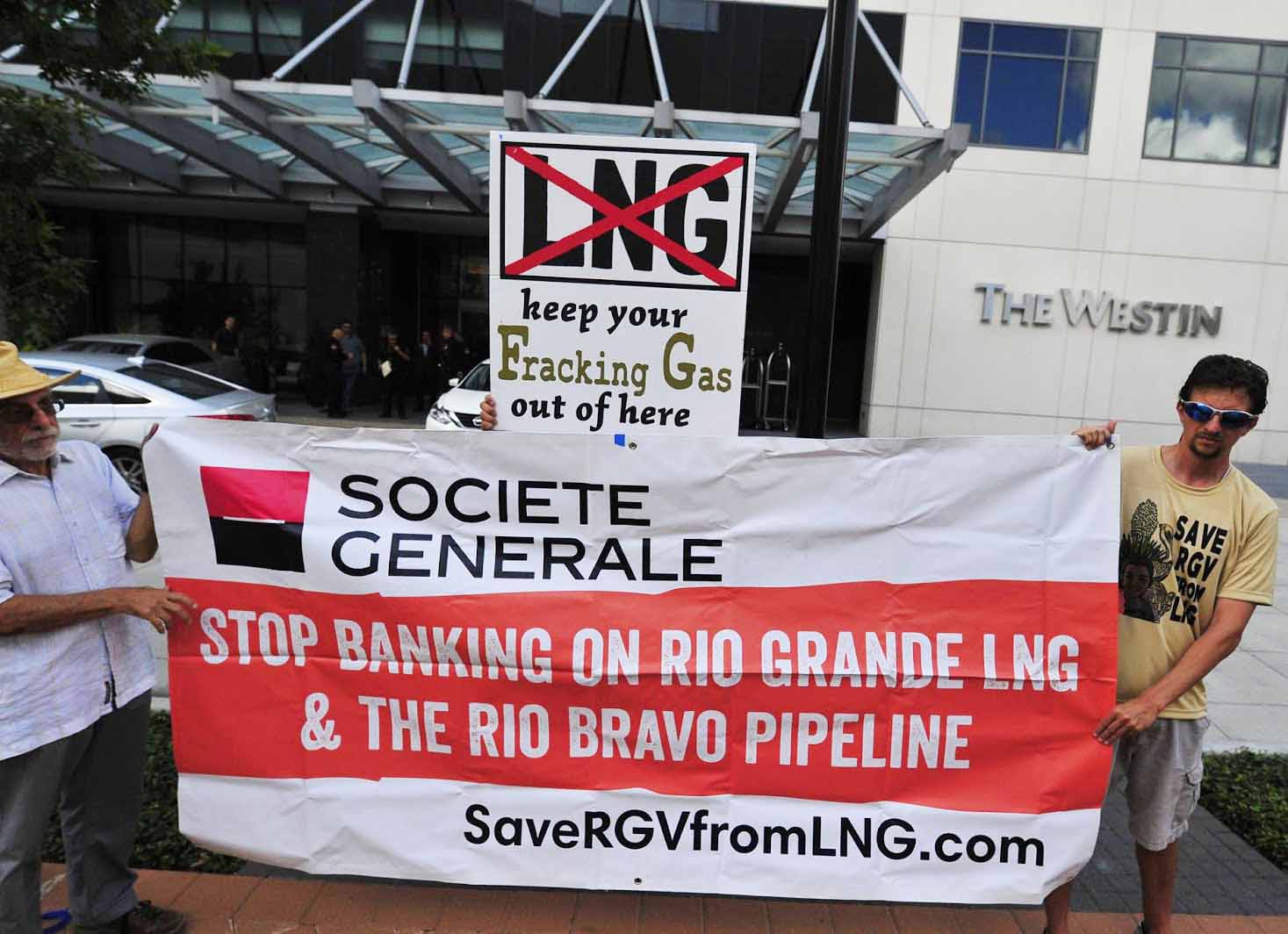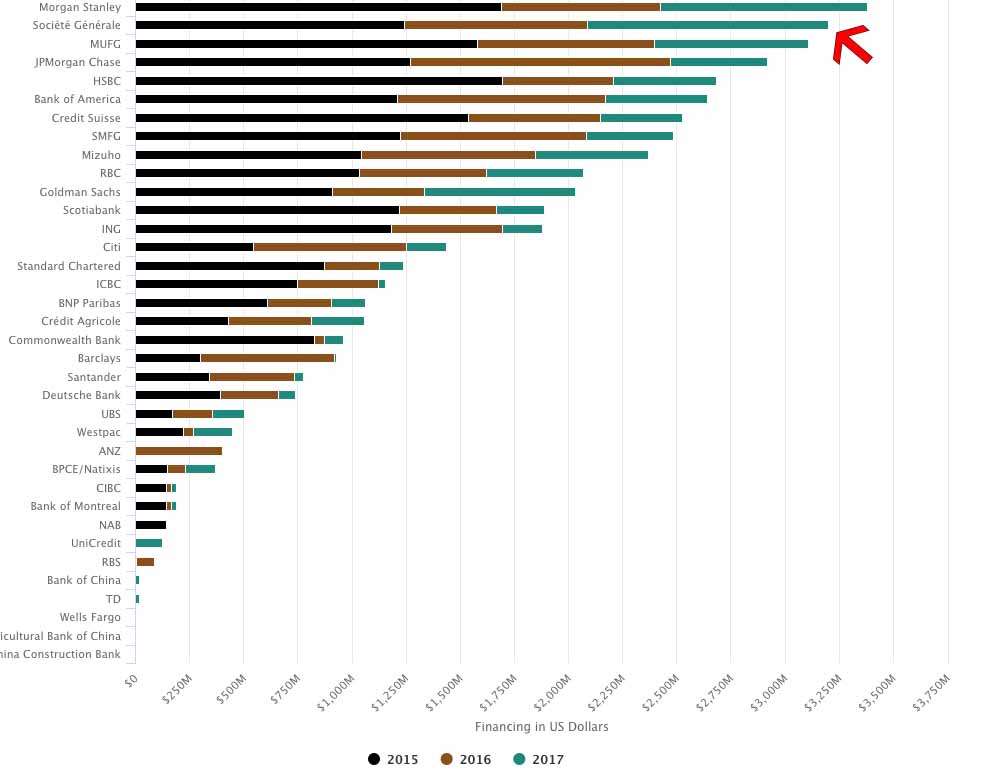People living in the United States may be familiar with the various divestment campaigns targeting corporate banks like Wells Fargo, Chase, and the Bank of America for their financial support of destructive fossil fuel projects. If you haven’t, you should check out this recent Sierra Club blog that describes the waves of public resistance surrounding annual general meetings this spring, including an Indigenous-led rally at JPMorgan Chase’s meeting in Plano in May to call out the bank for its investments in Canada’s tar sands, deepwater drilling in the Gulf of Mexico, and fracked gas in Texas.
The message to the big banks is clear: We don’t have time to waste when it comes to our climate crisis. We have the people power to send a strong message through the tangible action of withdrawing our money out of institutions that are actively contributing to climate change. We will hold you accountable.
But as an organization with the majority of our members, supporters, and volunteers living in the U.S., how can the Sierra Club put public pressure on foreign banks that are the financial advisors of dirty fossil fuel projects polluting our local communities?

The French Connections
In Texas, French bank Société Générale is the financial advisor for one of three proposed LNG terminals, Rio Grande LNG, as well as the Rio Bravo pipeline, in the Rio Grande Valley. In May, it published a new oil and gas policy stating that “Societe Generale [sic] recognises it has a role to play in the transition to a low-carbon economy and supports the efforts of governments and private sector to limit greenhouse [gas] emissions.”
That role could be that of the villain, when you consider the bank’s role as the biggest global banker of North American LNG, according to Rainforest Action Network’s Banking on Climate Change report. But if you knew little about “natural” gas, the bank’s well-crafted PR messaging would have you thinking that natural gas, and in particular liquefied natural gas, is a clean energy source and that the bank was a leader in the global transition to low-carbon energy.
Bank Financing Of LNG

Société Générale led LNG financing in 2017
Source: Rainforest Action Network’s Fossil Fuel Finance Report Card 2018
(*Red arrow added by Texas Sierra Club)
Collaborate With Partners
If built, the three proposed LNG terminals would pollute Rio Grande Valley communities and increase the demand for fracking in South Texas. The Rio Grande LNG terminal alone is estimated to pollute more than 8 million tons of greenhouse gases (GHG) per year (in addition to NOx, SO2, particulate matter, and other local pollution). There are severe health and environmental impacts at every point of the fracked gas cycle in Texas, a cycle we drew attention to through international #BreakTheFrackingCycle demonstrations earlier this year. The five-day campaign, which included a day devoted to focusing on the financing of the fracked gas cycle in Texas, required extensive collaboration with our allies at French non-profit Les Amis de la Terre (Friends of the Earth), who have an active divestment campaign against Société Générale.
Organizing in Texas to maintain public pressure on a French bank polluting South Texas communities is tricky when the majority of its clients and shareholders are across the Atlantic Ocean, but local group Save RGV from LNG (with support from the Sierra Club) has found ways to get creative, like the Twitter photo petition we ran during Sociéte Générale’s annual general meeting in May using the meeting’s own hashtag #AGSociétéGénérale, as well as our own #StopRioGrandeLNG.

While we host our own demonstrations to increase awareness of Société Générale’s role in dirty fossil fuel projects proposed for Texas, another strategic way we can keep up momentum from afar is collaborating on and uplifting the actions of Les Amis de la Terre in Europe.
“Société Générale denied the impacts of Rio Grande LNG during its annual general meeting in May once again, despite the environmental risks that have already been acknowledged by the biggest French bank, BNP Paribas,” said Lorette Philippot, a campaign representative for Les Amis de la Terre. “The resistance against Rio Grande LNG has to be just as French as it is Texan. We will continue to mobilize to make our voices heard on both sides of the Atlantic.”
Make Them Listen
Bank executives do not withdraw from dirty fossil fuel projects because of a change of heart or crisis of conscience. If it happens, it’s typically because expectations of profitability change for the worse. Some projects, though, may sour because of massive and persistent public pressure focused on negative impacts if the project goes through. That’s where the bank’s shareholders play a critical role in influencing investment decisions. It’s not just the board room that needs to hear about LNG’s nightmare scenarios, it’s everyone who owns a piece of the bank that needs to hear it, and hear it often.
We know that this kind of public pressure can work because we’ve seen it happen. Last spring, Rio Grande Valley Organizer Rebekah Hinojosa and Carrizo Comecrudo Tribe Chairman Juan Mancias traveled to Paris, France, to meet with bank shareholders, including those of Société Générale and BNP Paribas. In October 2017, BNP Paribas revised its oil and gas policy and announced that it would cut business with tar sands and fracked gas, which included advising Texas LNG or any other LNG export terminal or gas pipeline in North America. That announcement was a major win for Valley organizers and communities, who have opposed these LNG projects for several years.
Three Proposed LNG Projects For The Rio Grande Valley
Call Out The Conflict
In light of the huge negative impacts Texas will endure if more LNG development is built on our coastline, and the substantial GHG pollution it would contribute to our climate crisis, Société Générale’s oil and gas policy and their Corporate Social Responsibility statements do not match their investment decisions.
What kind of weight does Société Générale’s CSR policy hold if it supports a dangerous fracked gas project in South Texas that local communities oppose?
Whenever policies like these do not match the actions of an institution, the stakeholders of that institution need to be told. We will continue to speak out and look for others in the United States, Europe, and other countries that may want fracked gas from Texas to wash their climate sins away, to spread the word and pressure these banks that supposedly espouse triple bottom lines to act like it.